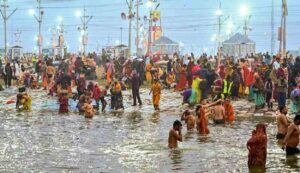Ganga remains completely germ-free despite over 60 crore visitors and countless holy baths during the Maha Kumbh
Prayagraj: The Ganga is still totally germ-free even after more than 60 crore tourists and innumerable sacred baths during Mahakumbh.

The Ganga is the only freshwater river in the world, according to research by a top scientist, where 1,100 different kinds of bacteriophages spontaneously clean the water by removing pollutants and destroying 50 times as many germs as there are, even changing their RNA.
Once hailed by APJ Abdul Kalam, Padma Shri Dr. Ajay Sonkar has made a groundbreaking discovery on Ganga water at Mahakumbh. The leading scientist compares the Ganga’s strength to that of saltwater, citing its bacteriophages’ ability to eradicate pollutants and dangerous microorganisms before disappearing. These bacteriophages are referred to as the Ganga’s “security guard” since they immediately clean the water.
In addition to working with prestigious universities including Wageningen University, Rice University, Tokyo Institute of Technology, and Harvard Medical School, Dr. Sonkar is a world-renowned researcher in the fields of cancer, genetic code, cell biology, and autophagy.
According to Sonkar, there are 1,100 different kinds of bacteriophages in Ganga water, which function as security guards by accurately detecting and getting rid of dangerous germs. Despite being 50 times smaller than bacteria, bacteriophages are very powerful.
They enter bacteria, damage their RNA, and then kill them. As thousands of people take a sacred plunge during Maha Kumbh, Ganga perceives germs generated by the body as a danger. According to the press release, its bacteriophages eliminate them immediately.
The research claims that bacteriophages are unique in that they solely eliminate dangerous germs. Numerous bacteria are targeted and eliminated by Ganga’s 1,100 different kinds of bacteriophages. 100–300 new phages are quickly produced by each one, continuing the onslaught and eradicating dangerous germs. Ganga’s bacteriophages exclusively attack germs that are introduced while bathing; they are host-specific. The marine action that cleanses seawater is mirrored in this self-cleaning mechanism.
The medicinal potential of bacteriophages—which may target pathogenic germs without hurting good ones—is highlighted by Dr. Ajay Sonkar. According to him, the Ganga’s special ability to purify itself is a message from nature: just as the river protects itself, so too must humans coexist peacefully with nature to avoid nature acting on its own initiative.
Dr. Yoshinori Ohsumi, a Japanese scientist who was awarded the 2016 Nobel Prize, and Dr. Ajay have collaborated extensively on cell biology and autophagy at the Tokyo Institute of Technology. Additionally, he has previously worked at Harvard Medical School on sensitive guts and cognitive fitness.





